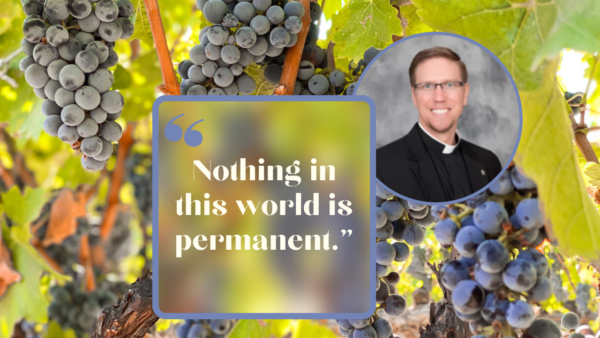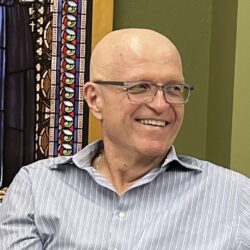Sundry Ruminations

By Fr. Paul Gros
Dear Family in Christ, Peace in the Lord Jesus Christ!
As some of you may know, one of my favorite pastimes is reading. I like to read on many subjects including spirituality, theology, political science, as well as novels. But I also like to read history, particularly Church history and World War II history. Several months ago, I picked up a book on WWII that focused on “diagnosing” the “ends and outs” of the war. Before the U.S. entered the war, the only thing standing between the Axis Powers and the complete takeover of Europe was the British Royal Navy and Air Force. The Brits were so proud of their navy and air force that whenever a sailor or a pilot was killed in action rather than saying “they died in action” they would say “he was posted to another station.” This helped them see that life was just a journey, and death was not the end.
In our second reading this Sunday St. Paul, who was writing from prison to the Philippians, seems to be stuck in a dilemma – whether he should desire life or death. For it was in his faith both seemed to appeal to him. He writes “for to me life is Christ, and death is gain” (Phil. 1:21). St. Paul’s “true life” began on the road to Damascus when Jesus appeared to him and revealed to him the truth of the Christian faith, that faith that he was persecuting at the time (Acts 9). From that point, his entire life was changed for Christ – “life is Christ!” But, at the same time, St. Paul also saw “death as gain” only because he knew this was the final doorway to perfect union with Christ – “I long to depart this life and be with Christ, for that is far better” (Phil. 1:24).
The Greek word for “depart” is “analuein,” which is a means “striking camp, loosening the tent rope, pulling up the tent and moving on” (Barclay, 28). For St. Paul, life was a journey with Christ (“life is Christ”) and ultimately, to Christ (“death is gain”). What great faith and hope he had!
St. Paul’s perspective on life and death should be our perspective. Nothing in this world is permanent, so to hold on to it will only end in disappointment. Thus, we must “conduct [ourselves] in a way worthy of the gospel of Christ” (Phil. 1:27) so that death will merely be a “posting to another station.”
Finally, I want to thank everyone who was able to attend Theology in a Bottle this past Sunday. Of course, when it comes to prayer there is always far more to speak about than the time allotted, but I hope you were able to learn something new about prayer. At the end of the presentation, I forgot to mention two resources that I have found very helpful especially in meditating on Sacred Scriptures. The first is a four volume book series entitled “The Better Part” by Fr. John Bartunek. Fr. Bartunek guides you through all four Gospels while also breaking down each Gospel passage into four aspects of Christ that may help the reader meditate on His life.
The second is a smartphone app called “Hallow.” “Hallow” helps readers meditate on the daily Gospel by slowly reading it aloud and gives them time to think about what was read. It also has many other features that can be a great aid to prayer. I hope these can be of some assistance in your prayer!
Have a wonderful week!
